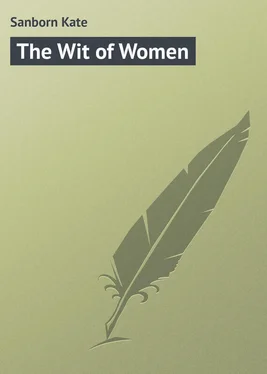Kate Sanborn Kate - The Wit of Women
Здесь есть возможность читать онлайн «Kate Sanborn Kate - The Wit of Women» — ознакомительный отрывок электронной книги совершенно бесплатно, а после прочтения отрывка купить полную версию. В некоторых случаях можно слушать аудио, скачать через торрент в формате fb2 и присутствует краткое содержание. Жанр: foreign_prose, foreign_humor, на английском языке. Описание произведения, (предисловие) а так же отзывы посетителей доступны на портале библиотеки ЛибКат.
- Название:The Wit of Women
- Автор:
- Жанр:
- Год:неизвестен
- ISBN:нет данных
- Рейтинг книги:4 / 5. Голосов: 1
-
Избранное:Добавить в избранное
- Отзывы:
-
Ваша оценка:
- 80
- 1
- 2
- 3
- 4
- 5
The Wit of Women: краткое содержание, описание и аннотация
Предлагаем к чтению аннотацию, описание, краткое содержание или предисловие (зависит от того, что написал сам автор книги «The Wit of Women»). Если вы не нашли необходимую информацию о книге — напишите в комментариях, мы постараемся отыскать её.
The Wit of Women — читать онлайн ознакомительный отрывок
Ниже представлен текст книги, разбитый по страницам. Система сохранения места последней прочитанной страницы, позволяет с удобством читать онлайн бесплатно книгу «The Wit of Women», без необходимости каждый раз заново искать на чём Вы остановились. Поставьте закладку, и сможете в любой момент перейти на страницу, на которой закончили чтение.
Интервал:
Закладка:
At a Chicago dinner-party a physician received a menu card with the device of a mushroom, and showing it to the lady next him, said: "I hope nothing invidious is intended." "Oh, no," was the answer, "it only alludes to the fact that you spring up in the night."
A gentleman, noticeable on the porch of the sanctuary as the pretty girls came in on Sabbath mornings, but not regarded as a devout attendant on the services within, declared that he was one of the "pillars of the church!" "Pillar-sham, I am inclined to think," was the retort of a lady friend.
To a lady who, in reply to a gentleman's assertion that women sometimes made a good pun, but required time to think about it, had said that she could make a pun as quickly as any man, the gentleman threw down this challenge: "Make a pun, then, on horse-shoe." "If you talk until you're horse-shoe can't convince me," was the instant answer.
The best punning poem from a woman's pen was written by Miss Caroline B. Le Row, of Brooklyn, N.Y., a teacher of elocution, and the writer of many charming stories and verses. It was suggested by a study in butter of "The Dreaming Iolanthe," moulded by Caroline S. Brooks on a kitchen-table, and exhibited at the Centennial in Philadelphia. I do not remember any other poem in the language that rings so many changes on a single word. It was published first in Baldwin's Monthly , but ran the rounds of the papers all over the country.
"One of the Centennial buildings
Shows us many a wondrous thing
Which the women of our country
From their homes were proud to bring.
In a little corner, guarded
By Policeman Twenty-eight,
Stands a crowd, all eyes and elbows,
Seeing butter butter-plate
"'Tis not 'butter faded flower'
That the people throng to see,
Butter crowd comes every hour,
Nothing butter crowd we see.
Butter little pushing brings us
Where we find, to our surprise,
That within the crowded corner
Butter dreaming woman lies.
"Though she lies, she don't deceive us,
As it might at first be thought;
This fair maid is made of butter,
On a kitchen-table wrought.
Nothing butter butter-paddle,
Sticks and straws were used to bring
Out of just nine pounds of butter
Butter fascinating thing.
"Butter maid or made of butter,
She is butter wonder rare;
Butter sweet eyes closed in slumber,
Butter soft and yellow hair,
Were the work of butter woman
Just two thousand miles away;
Butter fortune's in the features
That she made in butter stay.
"Maid of all work, maid of honor,
Whatsoever she may be,
She is butter wondrous worker,
As the crowd can plainly see.
And 'tis butter woman shows us
What with butter can be done,
Nothing butter hands producing
Something new beneath the sun.
"Butter line we add in closing,
Which none butter could refuse:
May her work be butter pleasure,
Nothing butter butter use;
May she never need for butter,
Though she'll often knead for bread,
And may every churning bring her
Butter blessing on her head."
The second and last example is much more common in its form, but is just as good as most of the verses of this style in Parton's "Humorous Poetry." I don't pretend that it is remarkable, but it is equally worthy of presentation with many efforts of this sort from men with a reputation for wit.
THE VEGETABLE GIRL
Behind a market-stall installed,
I mark it every day,
Stands at her stand the fairest girl
I've met within the bay;
Her two lips are of cherry red,
Her hands a pretty pair,
With such a charming turn-up nose,
And lovely reddish hair.
'Tis there she stands from morn till night,
Her customers to please,
And to appease their appetite
She sells them beans and peas.
Attracted by the glances from
The apple of her eye,
And by her Chili apples, too,
Each passer-by will buy.
She stands upon her little feet
Throughout the livelong day,
And sells her celery and things —
A big feat, by the way.
She changes off her stock for change,
Attending to each call;
And when she has but one beet left,
She says, "Now, that beats all."
As to puns in conversation, my only fear is that they are too generally indulged in. Only one of this sort can be allowed, and that from the highest lady in the land, who is distinguished for culture and good sense, as well as wit. A friend said to her as she was leaving Buffalo for Washington: "I hope you will hail from Buffalo."
"Oh, I see you expect me to hail from Buffalo and reign in Washington," said the quick-witted sister of our President.
In epigrams there is little to offer. But as it is stated that "women cannot achieve a well-rounded epigram," a few specimens must be produced.
Jane Austen has left two on record. The first was suggested by reading in a newspaper the marriage of a Mr. Gell to Miss Gill, of Eastborne.
"At Eastborne, Mr. Gell, from being perfectly well,
Became dreadfully ill for love of Miss Gill;
So he said, with some sighs, 'I'm the slave of your iis;
Oh, restore, if you please, by accepting my ees.'"
The second is on the marriage of a middle-aged flirt with a Mr. Wake, whom gossips averred she would have scorned in her prime.
"Maria, good-humored and handsome and tall,
For a husband was at her last stake;
And having in vain danced at many a ball,
Is now happy to jump at a Wake."
It was Lady Townsend who said that the human race was divided into men, women, and Herveys . This epigram has been borrowed in our day, substituting for Herveys the Beecher family.
When some one said of a lady she must be in spirits, for she lives with Mr. Walpole, "Yes," replied Lady Townsend, "spirits of hartshorn."
Walpole, caustic and critical, regarded this lady as undeniably witty.
It was Hannah More who said: "There are but two bad things in this world – sin and bile."
Miss Thackeray quotes several epigrammatic definitions from her friend Miss Evans, as:
"A privileged person: one who is so much a savage when thwarted that civilized persons avoid thwarting him."
"A musical woman: one who has strength enough to make much noise and obtuseness enough not to mind it."
"Ouida" has given us some excellent examples of epigram, as:
"A pipe is a pocket philosopher, a truer one than Socrates, for it never asks questions. Socrates must have been very tiresome, when one thinks of it."
"Dinna ye meddle, Tam; it's niver no good a threshin' other folks' corn; ye allays gits the flail agin' i' yer own eye somehow."
"Epigrams are the salts of life; but they wither up the grasses of foolishness, and naturally the grasses hate to be sprinkled therewith."
"A man never is so honest as when he speaks well of himself. Men are always optimists when they look inward, and pessimists when they look round them."
"Nothing is so pleasant as to display your worldly wisdom in epigram and dissertation, but it is a trifle tedious to hear another person display theirs."
"When you talk yourself you think how witty, how original, how acute you are; but when another does so, you are very apt to think only, 'What a crib from Rochefoucauld!'"
"Boredom is the ill-natured pebble that always will get in the golden slipper of the pilgrim of pleasure."
Читать дальшеИнтервал:
Закладка:
Похожие книги на «The Wit of Women»
Представляем Вашему вниманию похожие книги на «The Wit of Women» списком для выбора. Мы отобрали схожую по названию и смыслу литературу в надежде предоставить читателям больше вариантов отыскать новые, интересные, ещё непрочитанные произведения.
Обсуждение, отзывы о книге «The Wit of Women» и просто собственные мнения читателей. Оставьте ваши комментарии, напишите, что Вы думаете о произведении, его смысле или главных героях. Укажите что конкретно понравилось, а что нет, и почему Вы так считаете.












